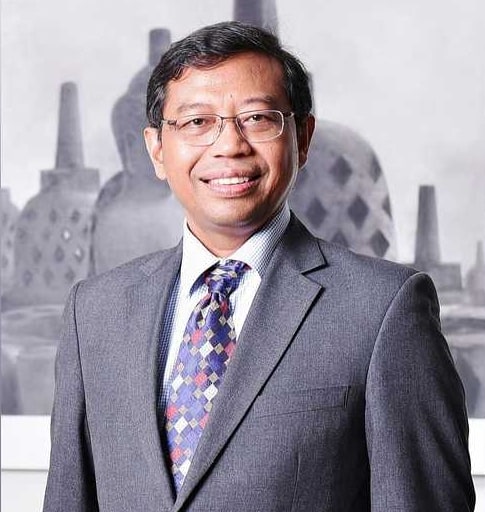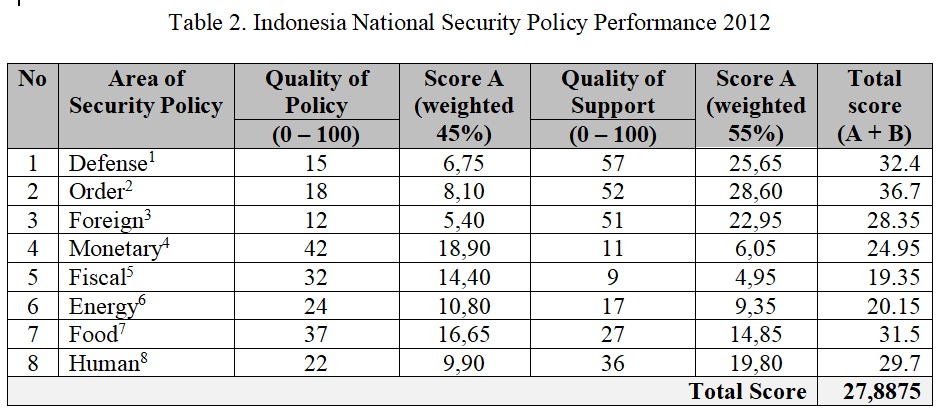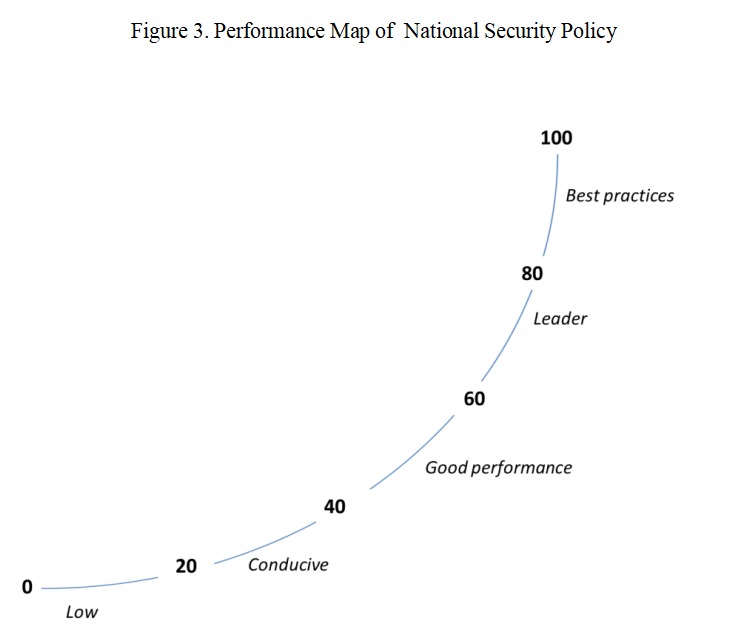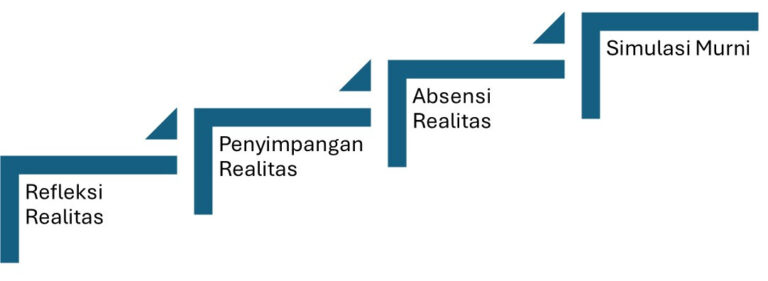Dr. Riant Nugroho
 Dr. Riant Nugroho served a Senior Lecture of the Indonesia Defense University (2010 – 2015), Senior Visiting Lecture of the Department of Administration and Public Policy, University of Indonesia. He was serving as Visiting Senior Lecture at the University of Malaya and Adjunct Professor of the School of Public Administration and Political Science, UESTC Chengdu, PR China.
Dr. Riant Nugroho served a Senior Lecture of the Indonesia Defense University (2010 – 2015), Senior Visiting Lecture of the Department of Administration and Public Policy, University of Indonesia. He was serving as Visiting Senior Lecture at the University of Malaya and Adjunct Professor of the School of Public Administration and Political Science, UESTC Chengdu, PR China.
Abstract:
There is a 2nd generation of academical framework as a fit foundation for developing policy and practices of the national security policy in the developing countries, as a framework that enlarging the understanding from international and military studies into a wider of political studies. Academical discourse in Indonesia is now promoting the framework of total policy performance in which national security policy place at the center. The seminal method and measurement of national security performance that have been developed had scored Indonesia of 27.8875, which means a conducive performance.
Keyword: policy, security, method and measurement
Introduction
National security is a United States of America (USA) concept as well as product post World War II. In 1947 USA released National Security Act[ The National Security Act of 1947 was a major restructuring of the United States government’s military and intelligence agencies following World War II. The majority of the provisions of the Act took effect on September 18, 1947, the day after the Senate confirmed James Forrestal as the first Secretary of Defense. His power was initially limited and it was difficult for him to exercise the authority to make his office effective. This was later changed in the amendment to the act in 1949, creating what was to be the Department of Defense. Wikipedia quoted from “Letter from James Forrestal to Chan Gurney”. Committee on Armed Services, Records of the U.S. Senate. U.S. National Archives and Records Administration. March 4, 1947, and Kinnard, Douglas. “The Secretary of Defense in Retrospect.” The Secretary of Defense. Lexington: University of Kentucky, 1980. 192-93.] as a milestone of the practice and studies of national security. The first generation of the national security studies was regarding to politics of international relations, war and defense, and intelligence studies (Collins, 2013; Weaver & Buzan, 2013). It was a political response toward an international intense conflict that would be name as “Cold War”. It was becoming a discipline since every modern public administration practice had to had intellectual as well as academical judgement.
The year of 1950-1960s were the Its golden age of the first generation of national security studies. The core issue of the studies was about US and its allies and USSR with its allies. The race for nuclear armaments-based sovereignty had led the study climbing from the contestation to the disarmament. Cuba crises on October 1962 over the installation of nuclear-armed Soviet missiles on Cuba was one of the culminations of practice and studies of the first generation in national securities.
As Paul Seabury (1963) noted, national security is in regard to the idea of national interest may refer to some ideal set of purpose which a nation should seek to realize in the conduct of its foreign relations (see also, KJ Holsti, 1967). It is the common ground of the first generation of the national security understanding. The mainstream of the studies of the studies were deterrence which was supported by first generation computer simulation developed by cybernetics theory, game theory, and experimental psychology (Weaver & Buzan). As noted by Weaver and Buzan:
“Deterrence theory becomes a success theory … for two reasons. On one hand, it produced a seemingly productive (‘progressive’) research programmed where theoretical work produced ever new and more complex problem than could in turn be dealt with new theoretical moves. On the other hand, all this seemed highly useful because the theories actually produced their own reality of abstraction, the world of ‘secure second strike capability’, ‘extended deterrence’, ‘escalation dominance’ …the whole ‘Golden Age’ idea is a self-glorifying construction of academics whose real accomplishment was to make morally corrupt government policies (MAD, Vietnam) look respectable and/or inevitable (Weaver & Buzan, 2013: 397).
In 1980s International Relation lead of the national security studies has been challenged as the cold war has been ended by the fall of the Berlin Wall and continued by the end of the USSR. There were two realities that fade away: the “what so called” socialist block and national security as “conflict among countries”. The main business of the countries in the new world are business. Even the “communist” countries, as such PR China, are focusing their policies and actions toward economic prirorities than military and war preparation. Business intelligent is now more popular than military intelligent.In the political sphere, the world has fulfilled with political and cooperation and the duty of military institution mostly is military operation other than war (MOOW)[ Military Operations Other Than War (MOOTW) focus on deterring war, resolving conflict, promoting peace, and supporting civil authorities in response to domestic crises. The phrase and acronym were coined by the United States military during the 1990s, but it has since fallen out of use. The UK military has crafted an equivalent or alternate term “peace support operations” (PSO). Both MOOTW and PSO encompass peacekeeping, peacemaking, peace enforcement and peace building. See Wikipedia.].
The conseqeunce is that the study of national security based on International Relation disccipline was becoming narrow and stifled. However, it seems like the scholars in US keep the idea of national security as international relation and military conflict among country. The most common explanation is an expanded theory of “military-industrial complex” (MIC)[ A concept that coined by President Dwight D. Eisenhower in his 1961 farewell address. Eisenhower warned: “In the councils of government, we must guard against the acquisition of unwarranted influence, whether sought or unsought, by the military-industrial complex. The potential for the disastrous rise of misplaced power exists and will persist.” Eisenhower (or his speechwriters) did not coin the phrase, but its previous usage referred to physical connections between industrial and military production, not political relationships. Eisenhower referred to a novel set of challenges facing the American polity in the Cold War, while other definitions refer to more general relationships between the military and industry. – See more at: http://historynewsnetwork.org/article/869#sthash.a0PrXRkU.dpuf]. The first generation of national security discipline is fit with US standing as a “global policeman”; with its military power, US is working to keep peace and security around the world, and in certain case is stronger than United Nation efforts. Post “911” tragedy, US was intensifying the first-generation base of national security action by fighting terrorist’s home base (Weaver & Buzan, 2013: 400), as it happened to Iraq to fight Saddam Hussein and Taliban’s Pakistan, meanwhile watching-over some Islamic-majority countries in southern Asia. Domestically, US is strengthening its national security approach by developing a new institution of “Homeland Security”, a thoroughly domestic’s security approach[ When President George W. Bush proposed that Congress create a cabinet-level Department of Homeland Security during his television address on the evening of June 6, 2002, he called it “The most extensive reorganization of the federal government since the 1940s.” The news media picked up on this aspect of the proposal and made it a central element of their coverage. The President was referring to the National Security Act of 1947, and its subsequent amendments, which subordinated the command structures of the United States Army, Navy, and newly created Air Force to a cabinet-level Department of Defense. The act also created the National Security Council and the Central Intelligence Agency. Together these institutions provided the framework future presidents used to wage the Cold War. – See more at: http://historynewsnetwork.org/article/887#sthash.I5nIqBPj.dpuf].
However, as a country, US main business is still business, as noted by Robert D. Hormats, Under Secretary for Economic, Energy and Agricultural Affairs that US will keep the commitment to strengthen its strong position in the global economy as a reconfirmation the second understanding on national security, it is the economic security.
“…. what we need to do at home to strengthen our position in the global economy, and what we need to do internationally to strengthen our domestic economy because, more and more, what we do internationally has an impact on what happens in the U.S. economy and vice versa… We have a big economy in the United States and we understand that we have a responsibility to our own citizens to strengthen our economy. We also understand that a strong American economy and a strong American financial system are important to the global economy. And second, how do we relate to what is going on and work with other countries, critically the emerging economies, to develop new international rules and norms for a fair and well-functioning global system in the 21st century?” [ Robert D. Hormats, Under Secretary for Economic, Energy and Agricultural Affairs at New York Foreign Press Center, NY, September 19, 2011].
But, it is a discourse for a developed country. The developing and less developed country has been facing the more intense challenges toward their national security. As the budget for military is very limited, the war has replaced by cooperation, therefore there is a need for a new concept of national security; a concept that goes beyond international relation studies that now seeds in Indonesia discourse.
The Indonesia Case: In Search of Theory
Indonesia is a peacekeeper in the region[ On April 08 2014, President Susilo Bambang Yudhoyono of Indonesia inaugurated the Indonesia Peace and Security Center (IPSC), in Sentul, West Java, which will provide world-class training for local and international stakeholders. It is a Southeast Asia’s largest training center for counterterrorism and United Nations (UN) peacekeeping. Yudhoyono noted that the center is proof of Indonesia’s commitment to maintaining global peace, as stipulated in the 1945 Indonesia Constitution. ] as the national constitution noted that the role of the nation is to bring peace of the world. Therefore, the national security policies and practices in Indonesia is need to be legitimated and supported more than the first-generation study, the international relation. The problem is, the understanding is keep influenced only by the study: it is more about military issue than other wider-spectrum issue that challenged the country. Therefore, when President brought the draft of National Security Act om 18 June 2011, a year after an intense debate, on 20 March 2012 there were seven elements of the National Parliament[ Partai Demokrasi Indonesia Perjuangan (PDIP), Golkar, Partai Amanat Nasional (PAN), fraksi Partai Keadilan Sejahtera (PKS), Partai Kebangkitan Bangsa (PKB), Partai Persatuan Pembangunan (PPP), and Hanura. See Kompas March 21, 2012.] discarded the bill. The policy process was suspended until now.
Indeed, there were some political reasons of the Parliament to veil the conclusion, that lead by the “military comeback” issue, a policy and practice in Indonesia before “1998 Reform” that make the country nicknamed by a military-regime one. The Bill was endangered human right issue of the country. Academically, the failure to proceed the policy because the policy-maker has unable to find the fit theoretical framework to legitimate and support the Bill. Indonesia has more domestic security issue and wider national-security based issues to be managed.
As many others developing country, Indonesia has been experiencing of internal conflict. There were acts of disintegration (1945-1962), military coup (1965), terror, ideological and ethnical conflict (1945 – now). The country has a conflict emergency from time to time. Those conflicts are easily turn into a severe crisis. The conflicts stem from wider-range of societal issues with the core ones are economics, ethnic, and social discomfort. Therefore, the fit theory to support the national security policy in Indonesia is need to be enlarged that international relation and military issues.
Actually, there are academical contribution has been founded. Wolfers (1962: 150) argue that security, in any objective sense, measures the absence of threats to acquired values, in a subjective sense, the absence of threats to acquired values, in a subjective sense, the absence of fear such values will be attacked. Bellamy (1981: 102) found that security itself is a relative freedom from war, coupled with a relatively high expectation that defeat will not be a consequence of any war that should occur. Ullman (1983: 133) stated that a threat to national security is an action or sequence of events that (1) threatens drastically and over a relatively brief span of time to degrade the quality of life of the inhabitants of a state, or (2) threatens significantly to narrow the range of policy choices available of the government of a state to the private and nongovernmental entities (persons, groups, corporations) within the state. Ayoob (1995: 9) noted that the security-insecurity is defined in relation to vulnerabilities –both internal and external—that threaten or have the potential to bring down or weaken state structures, both territorial and institutional, and governing regimes.
Booth (1991: 139) develops the concept of national security as emancipation. As an emancipation”, national security is to free of people (as individuals and groups) from physical and human constraints which stop them carrying out what they would freely choose to do…Security and emancipation are two sides of the same coin. Emancipation, not power or order, produces true security. Emancipation, theoretically, is security.
All the academical frameworks are relevant as a foundation of the second generation of the national security theory as well as discourse. A new concept that underpinning the policy and practice on national security in 21th century and the next. However, Barry Buzan, Ole Weaver, and Jaap de Wilde (1998: 21) has promoted a further-fit theory on national security of the developing countries as they noted that security is about survival. It is when an issue is presented as posing an existential threat to a designed referent object (traditionally, but not necessarily, the state, incorporating government, territory and society). The special nature of security threats justifies the use of extraordinary measures to handle them. The invocation of security has been the key to legitimizing the use of force, but more generally it has been opened the way for state to mobilize, or take special powers, to handle existential threats. Traditionally, by saying “security” a state representative declares an emergency condition, thus claiming a right to use whatever means are necessary to block a threatening development. National security is not as Luciani (1989: 151) framework any more when stated that national security may be defined as the ability to withstand aggression from abroad.
Therefore, the second generation of theoretical framework of national security that fit for the developing country, especially in Indonesia case, is about nation’s survival and excellence in every strategic and vital interest of the nation. It is a wide-range understanding, from the ability to defend the country from military aggression from abroad, as noted by first generation of national security theoretical framework, to the human security, energy security, food security, financial security, water security, to the cyber and information security. It is beyond international relations and military study; it is a comprehensive and across-discipline studies.
It is not a very new definition, as in 1966 India has been developed the state of national security as an appropriate and aggressive blend of political resilience and maturity, human resources, economic structure and capacity, technological competence, industrial base and availability of natural resources and finally the military might (National Defense College India, 1966). The definition is also introduced even in the developed country as US, as Harold Brown, US Secretary of Defense (1977-1981) stated that national security is the ability to preserve the nation’s physical integrity and territory; to maintain its economic relations with the rest of the world on reasonable terms; to preserve its nature, institution, and governance from disruption from outside; and to control its borders. In 2010, President Obama formulated US national security as an encompassing definition by saying that it is include the security of the United States, its citizens, and U.S. allies and partners; a strong, innovative, and growing U.S. economy in an open international economic system that promotes opportunity and prosperity; respect for universal values at home and around the world; and An international order advanced by U.S. leadership that promotes peace, security, and opportunity through stronger cooperation to meet global challenges (Rhenson, 2010).
National security is then back to its basic: national interest. However, the interest is now expanding beyond the first generation as international relation (IR) realist theorist as the series is survival, vital, major, dan peripheral (Snow, 2011: 28). The understanding of “interest” is shifting from IR-minded toward political-minded, as the military issue alone has expanded into military, semi-military, and non-military security means dimension (Snow 2011: 57-8). Indonesia embrace the understanding of national interest as political term than IR term. It is not a hierarchy of four dimension of national security as survival interest, vital interest, major interest, and peripheral interest. In today understanding, those interests collide in a single pot. It could not separate into “important-not important” as prior understanding. It is in flux: sometimes what-so-called “vital”, “major”, or “peripheral” can be a “survival”, as national security is all about survival (see Buzan at all, 1998: 21). They overlap each other; lean each other; and support each other. What we have is not a segregation, but a degree of importance, that play in flux.
A Model of Method
A model of method to measure the quality of the national security has been developed since 2011[ The author has been doing independent research under University of Indonesia, Indonesia Defense University, and Commando School of Indonesia Military (Sesko TNI).] to formulate the measurement of the 2nd generation of national security performance. The premise s that the national security policy is the core policy for every nation-state. Therefore, national security policy is placed at the center of the overall key policy of the nations (see figure 1). When all the policy in its place (position of “Circle A”) the policy of the national policy ecosystem is becoming a sector’s policy. It is become the matter of Ministry or Governor/Major/Regent. However, at the certain condition, the issue is abscessing and across the national security criteria (position of “circle B”), it is then becoming national security issue and become National Leader’s Accountability –President or Prime Minister. It is illustrated when a food supply in a country is in the “secure condition”. At a certain level, because of long-dry-season, food sufficiency is below toleration, it is endangering national stability and development sustainability (see figure 2). It is then becoming national security issue (from position “C” to “D”).
In order to measure the performance of national security of a country, it is being developed of a simple model of measurement range from zero (0) to a hundred (100) which level of performance arbitrary set as 0 – 20 is having a low performance; 20 – 40 is having a conducive performance; 40 – 60 is having a good performance; 60 – 80 is having a leader’s performance; and 80 – 90 is having best practices and considered as the world leader in national security policy (see figure 3)[ The idea is being inspired by Malcolm Baldrige for Performance of Excellence. The author is a founder of Indonesia Performance of Excellence Foundation, as a Malcolm Baldrige license holder in Indonesia. For Baldrige see www.nist.gov/baldrige. For IPE see www.indonesianqualityaward.org.].
The issue is how to measure the performance of the national security policy in Indonesia, since there is no method and measurement develop yet. Therefore, as a preliminary method, it is introduced eight areas as indicators of strategic policies to be measured as a total performance of the national security policy. The area of indicators is:
- Defense policy, reflected by relative position toward regional military power
- Domestic (security) policy [“order”], reflected by criminality level
- Foreign policy, reflected by diplomatic winning in the regional conflict
- Monetary (security) policy, reflected by exchange rate of national currency
- Fiscal (security) policy, reflected by tax management compare to the region
- Energy (security) policy, reflected by national electrification and oil-gas domestic consumption reserve
- Food (security) policy, reflected by national basic food sufficiency
- Human (security) policy, reflected by Human Development Index relative position in the region
There is method of measurement based on the score of quality of policy, scored from 0 – 100, and weighted 45% of total score; quality of support, scored from 0 – 100, weighted 55% (see table 1). The total score will be the proxy of the proxy of the national security policy, and placed at the map of the policy performance.
Independent research has been conducted in 2012 had founded that Indonesia score of the performance of its national security policy is 27.8875. The score is contributed, firstly, by the quality of policy: 15 of Defense Policy, 18 of Domestic (security) policy, 12 by Foreign Policy, 42 by Monetary policy, 32 by Fiscal policy, 24 by Energy Security Policy, 37 by Food Security Policy, 22 by Human Security Policy. The second contribution is regard to the quality of support toward the policy from domestic side, as an endowment factor. It is contributed by Defense Policy by 57; Domestic (security) policy by 52; Foreign Policy by 51; Monetary policy by 11; Fiscal policy by 9; Energy Security Policy by 17; Food Security Policy by 27; and Human Security Policy by 36. (see table 2. Indonesia National Security Policy Performance). In regards to the performance map, the score of 27.8875 is meaning a conducive performance[ For proxy of data, see appendix table 2.].
Conclusion
Indonesia, as a developing country, need a fit and appropriate national security academical framework. The academical discourse the author had led is leading into a seminal 2nd generation national security theory. However, the academical framework –as well as theory—has been provided by scholars from many different countries, academical and ideological background. The method that developed in Indonesia is hopefully contribute to the next research and method development in measuring the performance of the national security policy.
In case of Indonesia, the score is 27.8875; it is meaning a conducive performance. The score which is develop only by academical and observational proxy conduct by limited individual and independent research, has become significant contribution toward theoretical development of national security studies in Indonesia, and a continuing effort of the Government of Indonesia to find its gap and to cope with the today and future challenge of the national security.
Indeed, the research is unable to capture the recent issue of national security policy; it is cyber security; as it still an amorph concept and practice. It is Cavelty (2013) that noted that cyberspace connotes the fusion of all communication networks, databases, and sources of information into a vast, tangled, and diverse blanket of electronic interchange. There is a need for further discussion and research to find a method to embrace into the total performance measurement of national security policy[ US one of many prominent countries which pay attention at most on cyber security, as President George Bush Jr. has noted in the National Security Document that the way business is transacted, government operates, and national defense is conducted have changed. These activities now rely on an interdependent network of information technology infrastructures called cyberspace. The National Strategy to Secure Cyberspace provides a framework for protecting this infrastructure that is essential to our economy, security, and way of life. Canada is the other country which in its National Security Policy Document noted that Cyber-security is at the forefront of the transborder challenge to Canada’s critical infrastructure. The threat of cyber-attacks is real, and the consequences of such attacks can be severe. To achieve a more proactive cyber-security posture and to keep pace with the efforts of key allies, the Government will strengthen its capacity to predict and prevent cyber-attacks. To this end, the Government will substantially improve threat and vulnerability analyses for its systems, and strengthen its ability to defend its systems and respond to cyber-incidents. The Government will also convene a high-level national task force, with public and private representation, to develop the National Cyber-security Strategy to reduce Canada’s vulnerability to cyber-attacks and cyber-accidents.].
References
Abshire, David M., and Richard V. Allen, eds., 1963, National Security, New York: Hoover Institution/Praeger.
Beaufre, Andre, 1965, Deterrence and Strategy, Washington: Frederick A. Praeger Publisher
Buasan, Bahar, ed., 2012, Perilaku Nasionalistik Masa Kini dan Ketahanan Nasional, Yogjakarta: Matabangsa
Cavelty, Myriam Dunn, 2013, “Cyber Security”; Alan Collins, 2013, Contemporary Security Studies, 3rd edition, Oxford: Oxford University Press
Canton, James, 2007, The Extreme Future: Top Trends that Will Reshape the World in the Next 20 Years, New York: Plume
Chomsky, Noah, 2006, Failed States, New York: Metropolitan Press
Clarke, Richard A., and Robert K. Knake, 2010, Cyber War: The Next Threat to National Security and What to Do About It, New York: Harper & Collins
Cleary, Laura R., 2006, “Political Direction: The Esssence of Democratic Civil and Civilian Control”, Cleary & McConville, eds., 2006, Managing Defense in A Democracy, London-New York: Routledge
Collins, Alan, ed., 2013, Contemporary Security Studies, 3rd edition, Oxford: Oxford University Press
Davidow, William H., 2011, Overconnected: The Promise and Threat of the Internet, New York: Delphinium Books
Dye, Thomas R., 2015, Understanding Public Policy, 15th ed., New Jersey: Prentice Hall.
Friedman, George, 2009, The Next 100 Years: A Forecast for the 21th Century, New York: Anchor Book/Random House
George, Roger Z., and Robert D. Kline, eds, (2006), Intelligence and the National Security Strategist: Enduring Issue and Challenges, Washington DC: National Defense University Press.
Hakim, Chappy, 2011, Pertahanan Indonesia: Angkata Perang Negara Kepulauan, Jakarta: Red & White Publishing
Jonathan Kirshner, ed. (2006), Globalization and National Security, New York: Routledge
Kugler, Richard L., (2006), Policy Analysis in National Security Affairs, Washington: National Defense University Press.
Kuntjoro-Jakti, Dorodjatun, 2012, Menerawang Indonesia pada Dasawarsa Ke Tiga Abad ke-21, Jakarta: Alfabet
Maarif, Syamsul, ed., Militer Pasca Perang Dingin, Jakarta: Prenada.
Mansbach, Richard W, dan Kirsten L. Rafferty, 2012, Pengantar Politik Global, Bandung: Nusamedia
Nugroho, Riant, (2018), Public Policy, Jakarta: Elex/Gramedia
Nugroho, Riant, 2014, National Security Policy, Yogjakarta: Pustaka Pelajar.
Donald E. Nuechterlein, 1979, “The Concept of `National Interest’: A Time for New Approaches,” Orbis, 23, Spring 1979.
Kementerian Pertahanan RI, (2008), Buku Putih Kementerian Pertahanan, Jakarta: Kemhan
Nuechterlein, Donald, 20000, “National Security” University of Virginia, to the Naval Air, Executive Seminar on National Security, November 7, 2000.
Nye, Joseph S., 2004, Soft Power, New York: Public Affair.
Probst, Reed R. (1985) “Clausewitz on Intelligence”, Studies in Intelligence 29, no. 3. Fall 1985
Renshon, Stanley A. (2010), National Security in the Obama Administration, New York: Routledge
Sekretariat Jenderal Dewan Ketahanan Nasional, (2010), Keamanan Nasional: Sebuah Konsep dan Sistem Keamanan bagi Bangsa Indonesia, Jakarta: Sekjen Wanhanas.
Snow, Donald M., 2011, 4th edition, National Security for a New Era, London: Longman
Suryohadiprojo, Sayidiman, (2010), Si Vis Pacem Para Belum: Membangun Pertahanan Negara yang Modern dan Efektif, Jakarta: Pustaka Intermasa.
Appendices












